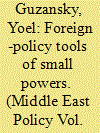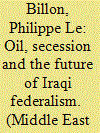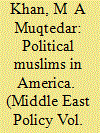|
|
|
Sort Order |
|
|
|
Items / Page
|
|
|
|
|
|
|
| Srl | Item |
| 1 |
ID:
142158


|
|
|
|
|
| Summary/Abstract |
This article analyzes the foreign-policy tools that Kuwait, Qatar, Bahrain, the United Arab Emirates (UAE) and Oman use in dealing with Iran. It argues that a policy of strategic hedging reduces the danger of conflict with Iran in the short term, while preserving contingency plans that address the severity of the threat and the uncertainty of the relationship in the long term. We could have expected that, because of their sense of threat, the small Gulf states would adopt a behavior of balancing Iran's power or, alternatively, of bandwagoning with it. However, these states have consciously chosen to adopt a “mixed” policy that includes elements of both methods. This stands in contrast to the assumption, widespread in the international-relations field, that they would choose to either balance1 or bandwagon as a way of coping with threats.
|
|
|
|
|
|
|
|
|
|
|
|
|
|
|
|
| 2 |
ID:
142157


|
|
|
|
|
| Summary/Abstract |
The rise of the Kurdistan Regional Government (KRG) in northern Iraq as well as the ongoing insurgency of the Kurdistan Workers Party (PKK) and now peace negotiations with the Turkish government have empowered the Kurds and challenged the existing political map of the Middle East. On July 19, 2012, the previously quiescent Syrian Kurds — largely under the leadership of the Democratic Union Party (PYD), closely associated with the PKK — also suddenly emerged as a potential game changer in the Syrian civil war and what its aftermath might hold for the future of the Middle East. In an attempt to consolidate an increasingly desperate position, government troops were abruptly pulled out of the major Kurdish areas.1 The Kurds in Syria had suddenly become autonomous, a situation that also affected neighboring Turkey and the virtually independent KRG in Iraq. Indeed, the precipitous rise of the Kurds in Syria could become a factor in changing the artificial borders of the Middle East established after World War I by the notorious Sykes-Picot Agreement
|
|
|
|
|
|
|
|
|
|
|
|
|
|
|
|
| 3 |
ID:
142156


|
|
|
|
|
| Summary/Abstract |
In Turkish political circles, there is a popular quip: “The United States wanted Turkey and Iraq's Kurds to become friends, not get married.”1 As their cooperation deepens, especially in hydrocarbons, observers increasingly question whether the relationship will endure. A solid strategic relationship is born of shared national interests, mutual respect and real interdependence. Fleeting cooperation, in contrast, stems from a temporary confluence of political interests, typically dependent on the personalities and preferences of leaders who may fall from power in the foreseeable future. Such cooperation can fulfill pressing needs, but both parties know the arrangement will be discarded in short order.
|
|
|
|
|
|
|
|
|
|
|
|
|
|
|
|
| 4 |
ID:
142153


|
|
|
|
|
| Summary/Abstract |
The pieces in this special section discuss the wider oil and gas politics of the autonomous Kurdistan Region of Iraq (KRI, also known as the Kurdistan Regional Government, KRG). This debate has two distinct components: the internal dangers faced by an autonomous region almost exclusively relying on hydrocarbon revenues, and the geopolitical power struggles in the Middle East. Especially when held within the KRI, both themes form part of the discourse on hydrocarbon-enabled independence. Referring to international examples as well as the current regional geopolitical and security situation, these articles will outline the dangers and challenges of a hydrocarbon-induced Kurdish independence. While the authors are international experts in their fields, this collection of essays is compiled from within the KRI and is the output of an academic process initiated by Soran University in early 2014.
|
|
|
|
|
|
|
|
|
|
|
|
|
|
|
|
| 5 |
ID:
142154


|
|
|
|
|
| Summary/Abstract |
Oil wealth increases the risk of both authoritarianism and secessionist conflict.1 Iraq's 2005 federal constitution sought to address this dual risk by granting regions and provinces a high degree of autonomy and allocating oil revenues according to a mix of demographic and historical-grievances criteria.2 Reflecting a classic conundrum of federalism, the new constitution has both prevented and facilitated secessionism, in part because of an imprecise text allowing for multiple interpretations.3 Born mostly out of demands from Kurdish legislators, Iraqi federalism faced repeated setbacks, reaching a point of crisis in 2014 as a result of widespread grievances towards Nuri al-Maliki's Shiite-dominated regime in Baghdad, major tensions over the distribution of oil revenues, and resurgent Sunni militancy following U.S. military withdrawal. By July 2014, the Islamic State of Iraq and Syria (ISIS) and associated Sunni insurgent groups had taken over much of western Iraq, enacting a de facto partition of the country by declaring the creation of an Islamic Caliphate.4 A breaking apart of Iraq seemed even more likely as the Kurdish Regional Government (KRG) gained control of some of its disputed territories — including oil-rich Kirkuk — consolidated its own oil exports via Turkey, and considered a referendum for independence. By early 2015, the situation had returned to a “new normal”: Shiite politicians still dominated federal institutions, and Shiite oil-rich governorates demanded more direct control over oil revenues; the prospect of an autonomous Sunni region under ISIS rule with limited access to oil revenues had become a reality; and the KRG had regained policy traction in Baghdad and continued to pursue self-sufficiency in oil revenues. Focusing on this latter point, this article outlines some of the oil-related consequences of federalism in Iraq for the Kurdistan region and discusses some of the risks of partition in light of South Sudan's experience with secession.
|
|
|
|
|
|
|
|
|
|
|
|
|
|
|
|
| 6 |
ID:
142151


|
|
|
| 7 |
ID:
142152


|
|
|
| 8 |
ID:
142150


|
|
|
|
|
| Summary/Abstract |
The following is an edited transcript of the seventy-ninth in a series of Capitol Hill conferences convened by the Middle East Policy Council. The meeting was held on January 20, 2015, at the Rayburn House Office Building in Washington, DC, with Omar Kader moderating and Thomas R. Mattair as discussant.
|
|
|
|
|
|
|
|
|
|
|
|
|
|
|
|
| 9 |
ID:
142155


|
|
|
|
|
| Summary/Abstract |
Historically the role of the Kurds and Kurdish parties in Syria has been shaped by the Syrian government's regional power politics. Within Syria, the status of the Kurdish population ranges from being tolerated to being actively oppressed. At the same time, the Syrian government used the Kurdistan Workers' Party (PKK) as a proxy to wage war in response to Turkey's “water-dam politics” that left Syria vulnerable to droughts. Within this complicated and ever-changing power landscape, the Kurds and the PKK had to adapt their aims and strategies.1 However, with the loosening grip of the Assad regime in 2011, the situation changed, and Syria's Kurds were able to take control of the Kurdish-majority areas. In particular, parties affiliated with the PKK were able to make the most of the situation. In late 2014, the Kurdish-controlled areas, with the exception of the besieged town of Kobane, are some of the few parts of Syria that show relative stability.2 Apart from being an effective force against the jihadists of the Islamic State (IS), the Kurdish-led autonomous government is also the only one offering a political alternative to the repressive Assad regime and the violent Islamic State.
|
|
|
|
|
|
|
|
|
|
|
|
|
|
|
|
| 10 |
ID:
142159


|
|
|
|
|
| Summary/Abstract |
In 1908, the Ottoman Third Army marched from Macedonia to Istanbul and forced the sultan to restore the constitution, introduced in 1876 and suspended in 1878 under the duress of war with Russia. In 1909, chanting crowds of religious students (softas) and turbaned clerics, along with disaffected soldiers, swarmed through the streets of Istanbul, demanding an end to constitutional government and the introduction of sharia law. Revolution had been followed by a counterrevolution, but the army struck back and sent the sultan into exile. Dervis Vahdeti, head of the Muhammadan Society and publisher of the newspaper Volkan (Volcano), was hanged — along with many others — for his central role in instigating the uprising. In 1923, the revolution was consolidated with the establishment of the Turkish Republic. It took shape according to the vision of its founder, Mustafa Kemal “Ataturk,” and thus was modernizing and secular, confining religion to the mosque and the home, and emancipating women. The state was also one-party and authoritarian, driving political Islam and Kurdish identity underground, only for them to rise to the surface again decades later.
|
|
|
|
|
|
|
|
|
|
|
|
|
|
|
|
|
|
|
|
|